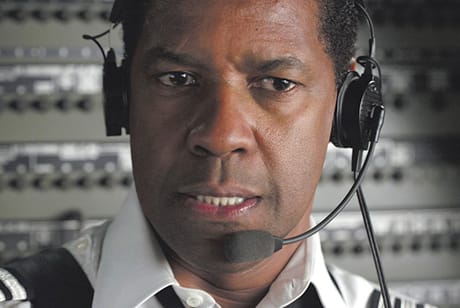Robert Zemeckis, who has spent the greater part of the last decade playing with motion-capture animation (Beowulf, The Polar Express, A Christmas Carol), is nothing if not a technical wizard. His eye for seamlessly integrating visual effects with emotionally charged, intense action is both commendable and reliable.
He's also a cinephile dabbler, insomuch as his films often mirror a present preoccupation of his with style and form, such as Forrest Gump's Capra-esque vision of an unlikely hero and What Lies Beneath's self-conscious mining of Hitchcock tropes.
With Flight, Zemeckis has stumbled into moralistic, after-school-special territory, weirdly reiterating a Cast Away formula, wherein his work is little more than a vessel for an Oscar-baiting performance for a popular leading actor. And as such, its limited ideological spectrum and self-contained, albeit cinematically ubiquitous, take on the nature of addiction as a destructive mode of sating the soul comes off as little more than white noise.
Although, before it reaches a state of tedium, Flight soars in its opening moments, creating mystery and tension with Captain Whip Whitaker (Denzel Washington) coming off a cocaine and booze bender with flight attendant Katerina (Nadine Velasquez) to fly a commuter flight between Orlando and Atlanta. Integrated with the building sense of unease is the peculiar addition of a second storyline with Atlanta junkie Nicole (Kelly Reilly), suggesting impending complex moral elements and juxtapositions.
Of course, all of this is interrupted by the jaw-dropping set piece of the film, wherein the plane goes into a nosedive, and Zemeckis pulls out all of his technical wizardry, with Whitaker astoundingly managing to limit the impact of the crash.
Unfortunately, after this spectacle of filmmaking, everything goes downhill when the question of heroism is muddled with socially acceptable modes of identity after it's discovered that Whitaker is an addict. Indeed, considering mass Judeo-Christian ethos and our cultural tendency to revel in the denigration and downfall of idols, this concept is in itself quite valid.
But Flight isn't interested in tackling complicated social issues, especially when they might suggest that human beings are inherently less than admirable. Instead, it withdraws from the procedural elements and takes Whip to his granddad's farm, where he battles personal demons, hitting rock bottom and eventually learning a valuable, albeit glib and out-dated, lesson that leaves the audience exiting the theatre no more enlightened than when they walked in.
Still, the plane crash sequence is pretty neat.
(Paramount Pictures)He's also a cinephile dabbler, insomuch as his films often mirror a present preoccupation of his with style and form, such as Forrest Gump's Capra-esque vision of an unlikely hero and What Lies Beneath's self-conscious mining of Hitchcock tropes.
With Flight, Zemeckis has stumbled into moralistic, after-school-special territory, weirdly reiterating a Cast Away formula, wherein his work is little more than a vessel for an Oscar-baiting performance for a popular leading actor. And as such, its limited ideological spectrum and self-contained, albeit cinematically ubiquitous, take on the nature of addiction as a destructive mode of sating the soul comes off as little more than white noise.
Although, before it reaches a state of tedium, Flight soars in its opening moments, creating mystery and tension with Captain Whip Whitaker (Denzel Washington) coming off a cocaine and booze bender with flight attendant Katerina (Nadine Velasquez) to fly a commuter flight between Orlando and Atlanta. Integrated with the building sense of unease is the peculiar addition of a second storyline with Atlanta junkie Nicole (Kelly Reilly), suggesting impending complex moral elements and juxtapositions.
Of course, all of this is interrupted by the jaw-dropping set piece of the film, wherein the plane goes into a nosedive, and Zemeckis pulls out all of his technical wizardry, with Whitaker astoundingly managing to limit the impact of the crash.
Unfortunately, after this spectacle of filmmaking, everything goes downhill when the question of heroism is muddled with socially acceptable modes of identity after it's discovered that Whitaker is an addict. Indeed, considering mass Judeo-Christian ethos and our cultural tendency to revel in the denigration and downfall of idols, this concept is in itself quite valid.
But Flight isn't interested in tackling complicated social issues, especially when they might suggest that human beings are inherently less than admirable. Instead, it withdraws from the procedural elements and takes Whip to his granddad's farm, where he battles personal demons, hitting rock bottom and eventually learning a valuable, albeit glib and out-dated, lesson that leaves the audience exiting the theatre no more enlightened than when they walked in.
Still, the plane crash sequence is pretty neat.
